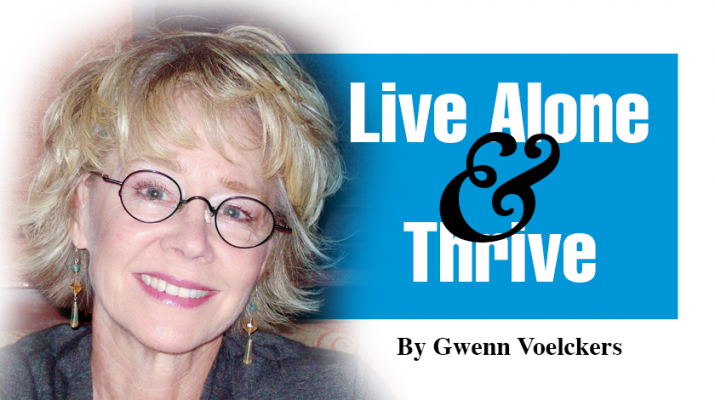Practical tips, advice and hope for those who live alone
By Gwenn Voelckers
 I remember the morning of Sept. 11, 2001, as if it were yesterday.
I remember the morning of Sept. 11, 2001, as if it were yesterday.
I was at work at the time, when we were summoned into the conference room. That’s where my colleagues and I watched TV in uncomprehending horror as the first tower collapsed and then the second.
We sat there together in stunned silence, until several coworkers abruptly stood up and ran to their offices to make phone calls to check on loved ones in New York City.
Moments later, we were dismissed for the day.
Shaken to the core, we gathered our things, slowly dispersed and went our separate ways.
I returned home in the middle of the day to a quiet house. Alone.
I made a few phone calls, but my friends and family had no words. Nor did I. We were all in shock. So, I turned on the TV and clung to the coverage as if it were a life raft. Commentators were trying to make sense of the unthinkable attack. Public figures were asking for prayers and offering reassurance.
It was all I had.
I remember longing for someone to sit beside me, to help me process the enormity of what was happening, to reassure me that we were safe, that life would go on. But there was no one.
That was my first real taste of facing a crisis alone.
And now, more than two decades later, I find myself — like so many others — struggling with those same emotions. Today, the enemy is not foreign terrorists but something that feels even closer to home.
At least half the country is grappling with an overwhelming sense of fear and vulnerability under the current administration in Washington DC.
Democratic norms are being disregarded, trusted experts removed, legal, environmental and consumer protections dismantled. Mass firings and deportations occurring and the stock market is tumbling as I write this.
Most alarming is the strategic shift toward Russia, undermining longstanding alliances and jeopardizing Ukraine’s future.
Once again, I find myself longing for someone by my side during all this chaos, but over the years, I have learned that living alone does not have to mean helplessness.
There are ways to cope, to stay resilient and to find a path forward — even when the world feels like it’s unraveling.
Here are some of the strategies that have helped me and I hope they help you, too.
1) Be Kind to Yourself
First and foremost, embrace self-compassion. These are extraordinary times and it is OK to feel overwhelmed. It is OK to take a moment to step back and acknowledge whatever feelings you are experiencing.
Ask yourself:
• Am I treating myself with the same kindness I would offer a friend going through a hard time?
• Am I allowing myself time to rest, recharge, meditate and pray?
• What small comforts can I give myself today — a warm drink, a cat nap, a walk outside or short drive in the country? Listening to audio books is my healthy distraction.
How can I create moments of peace within my day, even amid the chaos?
2) Connect with Trusted Friends, Family and Communities
Living alone does not mean being alone. You do not have to endure hard times in isolation. Connection is a lifeline, and it is more important now than ever.
Ask yourself:
• Who are the people in my life that make me feel heard and supported?
• Can I reach out to a friend today, even if it’s just a quick text, email or phone call?
• Are there local or online communities where I can engage in meaningful conversations?
• How can I be a source of support for others, knowing that connection is a two-way street?
3) Limit Your News Consumption
While I believe in staying informed, I also recognize the need to protect my sense of well-being. For me, too much exposure can be emotionally draining.
Ask yourself:
• Am I consuming news in a way that informs me or in a way that overwhelms me? More and more, I’ve found that reading the news causes me less anxiety than watching it. I can do without the breaking news banners, sensationalized stories and traumatic imagery.
• Can I set designated times for news updates?
• What are some trusted, balanced sources of information that won’t amplify my anxiety?
4) Take Meaningful Action . . . Do Something
Feeling helpless is something I struggle with during challenging times like this, but doing something — no matter how small — can be empowering.
Ask yourself:
• What causes or organizations align with my values, and how can I support them?
• Can I volunteer, donate or advocate in ways that will make an impact?
• How can I channel my frustration into constructive action? Writing this column serves this purpose. And I hope it motivates you and others to get involved.
• What practical steps can I take in my daily life to contribute to the change I wish to see?
5) Pursue Joyful Endeavors
Even in turbulent times, joy is not frivolous — it’s essential. Engaging in activities that bring you happiness can replenish your emotional reserves.
Ask yourself:
• What hobbies or creative pursuits bring me a sense of fulfillment?
• Can I set aside time to read, watch a movie or listen to music without guilt?
• How can I incorporate small moments of beauty into my day — a lit candle, fresh flowers, a beautifully wrapped package, a birdsong, a heartfelt thank you.
• What places or experiences make me feel at peace and how can I seek them out? You’ll often find me at the Lamberton Conservatory in Highland Park.
You Are Not Alone:
The truth is, these strategies can be applied to any crisis, whether it is a political upheaval, a personal loss or a medical emergency.
So, if you are living alone and struggling with uncertainty, know this: There are countless others who share your fears, your frustrations and your hopes for a better future.
By reaching out, taking action and caring for yourself, you can ease the burden of solitude and cultivate a renewed sense of purpose and resilience.
Remember — you are not alone. We will find a way forward. And we will do it together.
 Gwenn Voelckers is the author of “Alone and Content,” a collection of inspiring essays for those who live alone. She welcomes your comments about this column and topic suggestions for future columns at gvoelckers@rochester.rr.com
Gwenn Voelckers is the author of “Alone and Content,” a collection of inspiring essays for those who live alone. She welcomes your comments about this column and topic suggestions for future columns at gvoelckers@rochester.rr.com

